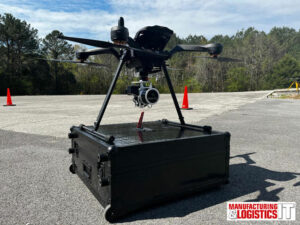Supply chain management software (SCM) is a term that embraces a wide range of software functionality. The joint purpose of these different modules and tools is to better execute supply chain transactions, manage supplier relationships and control all main business processes related to supply and delivery. The discipline of SCM covers everything from the storage and movement of parts and raw materials, to work in progress (WIP) and the management of goods and materials from source to the point of delivery to the customer. The APICS Dictionary describes SCM as the “design, planning, execution, control, and monitoring of supply chain activities with the objective of creating net value, building a competitive infrastructure, leveraging worldwide logistics, synchronizing supply with demand and measuring performance globally.
May 04, 2023

By Stephen Dombroski, Director of Food and Beverage Markets, QAD.
For many business organizations, internal departments working independently of one another is the norm. This norm creates siloed day-to-day functions and rigid disconnects in processes. This is especially true when it comes to sales and operations planning (S&OP).
May 03, 2023

Ben Dreyer, Boden’s Strategy, Sustainability and Operations Director, has been with the clothing retailer – which sells primarily online, through mail order and catalogue – for over 25 years. He has helped grow the business from a £10 million to £350 million company.
May 03, 2023

In an ongoing effort to help companies understand and shut the vulnerabilities that lie within their supply chains, the National Cyber Security Centre (NCSC) has issued its latest advice.
May 02, 2023

By Todd Simms, VP, Industry Strategy, Manufacturing at FourKites.
Like many technologies that preceded it, the potential impact and value of the Internet of Things (IoT) has been long heralded – and in manufacturing and ‘Industrial IoT’, in fact, a great deal has been accomplished in terms of leveraging IoT to monitor and improve the operation of manufacturing facilities, processes and to track goods-in-transit.
May 01, 2023

By Jeff Griffin, Vice President, Strategic Accounts, Nfinite.
Sustainability has become a critical consideration for retailers in recent years as consumers become increasingly environmentally conscious.
Apr 26, 2023

UK CPI fell from 10.4% to 10.1% in March, which should prompt companies to start to renegotiate costs with their suppliers, says international procurement and supply chain management consultancy INVERTO, part of Boston Consulting Group.
Apr 26, 2023

Two fifths (42%) of businesses across manufacturing, retail and 3PLs are planning to invest equal to or more than their annual warehousing costs on automation over the next five years, according to new research.
Apr 25, 2023

Sonepar, the B-to-B distributor of electrical products, solutions and related services, has selected Microsoft, Publicis Sapient and Hitachi Solutions to help drive the company’s digital innovation in a sustainable manner.
Apr 24, 2023

To help organisations achieve more with less, Oracle is introducing new capabilities across Oracle Fusion Cloud Applications Suite that help customers accelerate supply chain planning, increase operational efficiency, and improve financial accuracy.
Apr 19, 2023

New Moody’s Analytics research into third party risk management shows that the threat to reputations is a key driver of investment in supplier risk detection.
Supply chain management software (SCM)
Supply chain management software (SCMS) is a business term which refers to a whole range of software tools or modules used in executing supply chain transactions, managing supplier relationships and controlling associated business processes. Supply chain management spans all movement and storage of raw materials, work-in-process inventory, and finished goods from point of origin to point of consumption.
Supply Chain Management (SCM) includes all the activities that must take place to get the right product into the right consumer’s hands in the right quantity and at the right time. The supply chain manager supervises all the related logistical processes for the organisation. Effective supply chain management involves the coordination of all of the various elements of the chain as quickly as possible by harmonizing the contributions at each stage, including use of vendor partners and third-party service providers. This must be done as cost-effectively as possible and the priority is to be customer-driven.
Being more attentive to the stages throughout the length of the chain helps companies to stay competitive, reduces overall costs, increases efficiency and ultimately, keeps the customers happy. Supply chains are becoming increasingly integrated and complex, and as such now require dedicated and well-trained managers
Supply chain management (SCM) is sometimes broken down into the stages of planning, execution and shipping. Supply chain planning (SCP) and supply chain execution are the two main categories of SCM software. SCP software applications apply algorithms to predict future requirements and balance supply and demand.
Another definition is provided by the APICS Dictionary when it defines SCM as the “design, planning, execution, control, and monitoring of supply chain activities with the objective of creating net value, building a competitive infrastructure, leveraging worldwide logistics, synchronizing supply with demand and measuring performance globally.”
Supply chain execution (SCE) is the flow of tasks involved in the supply chain, such as order fulfilment, procurement, warehousing and transporting. SCE software applications track the physical status of goods, the management of materials, and financial information involving all parties.
Supply chain planning software helps organizations manage and replenish their inventory through sales and demand forecasting. As part of a supply chain management system, supply chain planning solutions like sales & operations planning (S&OP) serve an important function in the on-going effort to reduce waste and increase profitability.
Supply chain optimization software handles capacity planning as well as sequencing and scheduling. Beyond simply providing demand estimation data, it allows organizations to act immediately on any pertinent information gathered from the data by altering delivery schedules, shifting stored inventory loads, and adjusting revenue and expense projections.
Supply Chain standards and models:
There are a variety of supply chain models. The Supply-Chain Operations Reference model (SCOR) , developed by the management consulting firm PRTM, now part of PricewaterhouseCoopers LLP (PwC) has been endorsed by the Supply-Chain Council (SCC) and has become the industry standard diagnostic tool for supply chain management. SCOR measures total supply chain performance in terms of production flexibility, fulfillment performance, order delivery, reverse logistics efficiency/returns processing, warranty and general service levels.
- SEO Powered Content & PR Distribution. Get Amplified Today.
- PlatoAiStream. Web3 Data Intelligence. Knowledge Amplified. Access Here.
- Minting the Future w Adryenn Ashley. Access Here.
- Buy and Sell Shares in PRE-IPO Companies with PREIPO®. Access Here.
- Source: https://www.logisticsit.com/articles/2023/05/03/as-the-national-cyber-security-centre-provides-supply-chain-mapping-advice-companies-have-to-ensure-that-they-don’t-rely-just-on-‘trust’
- :has
- :is
- :not
- $UP
- 10
- 22
- 23
- 24
- 26
- 28
- 39
- 3PL
- a
- About
- accelerate
- accomplished
- According
- Accounts
- accuracy
- Achieve
- across
- Act
- activities
- advanced
- advice
- AI
- algorithms
- All
- allows
- an
- analytics
- and
- annual
- Another
- any
- applications
- Apply
- ARE
- articles
- AS
- associated
- At
- Automation
- Balance
- BE
- become
- becoming
- been
- BEST
- Better
- between
- BEVERAGE
- Beyond
- bigger
- boost
- boston
- Boston Consulting Group
- Broken
- Building
- business
- business processes
- businesses
- but
- button
- by
- Calendar
- capabilities
- Capacity
- categories
- centre
- chain
- chains
- Clothing
- Cloud
- cloud applications
- collaboration
- collaborative
- comes
- Companies
- company
- Company’s
- competitive
- complex
- conferences
- conscious
- consideration
- consultancy
- consulting
- Consumers
- consumption
- contributions
- control
- controlling
- coordination
- Costs
- Council
- covers
- CPI
- creates
- Creating
- critical
- CRM
- customer
- Customers
- cyber
- cyber security
- data
- day-to-day
- deal
- dedicated
- Defines
- delivery
- Demand
- Demand forecasting
- departments
- Design
- Detection
- developed
- different
- digital
- digital innovation
- Digital Transformation
- Director
- distribution
- do
- done
- Dont
- down
- drive
- driver
- each
- Effective
- efficiency
- effort
- elements
- Embraces
- end
- ensure
- Enterprise
- entry
- environmentally
- equal
- ERP
- especially
- Ether (ETH)
- events
- everything
- execute
- executing
- execution
- executive
- Exhibitions
- facilities
- Fall
- financial
- financial information
- financial planning
- Firm
- Flexibility
- flow
- food
- For
- from
- fulfillment
- function
- functionality
- functions
- fusion
- future
- General
- get
- Globally
- goods
- great
- Griffin
- Group
- Grow
- Growing
- Handles
- Hands
- happy
- Have
- he
- help
- helped
- helps
- hitachi
- http
- HTTPS
- immediately
- Impact
- important
- improve
- in
- includes
- Including
- Increase
- Increases
- increasingly
- independently
- industrial
- Industrial IoT
- industry
- inflation
- information
- Infrastructure
- Initiative
- innovating
- Innovation
- integrated
- internal
- International
- Internet
- internet of things
- into
- Introduces
- introducing
- inventory
- Invest
- investment
- involved
- iot
- Issued
- IT
- ITS
- joint
- journey
- jpg
- just
- Key
- latest
- Leadership
- Length
- less
- levels
- leveraging
- like
- LLP
- loads
- logistics
- Long
- Lot
- Main
- major
- manage
- management
- management system
- manager
- managing
- manner
- manufacturing
- many
- mapping
- March
- Markets
- materials
- measures
- measuring
- Microsoft
- million
- model
- models
- Modules
- Monitor
- monitoring
- Moody’s Analytics
- more
- movement
- must
- National
- NCSC
- Need
- net
- New
- next
- now
- objective
- of
- on
- ONE
- ongoing
- online
- OP
- operation
- operational
- Operations
- Opinion
- optimise
- optimization
- or
- oracle
- order
- organisation
- Organisations
- organizations
- Origin
- out
- over
- overall
- part
- parties
- partners
- parts
- party
- perfect
- performance
- physical
- pieces
- Place
- planning
- plato
- Plato Data Intelligence
- PlatoData
- Point
- possible
- Post
- potential
- practice
- predict
- president
- pricewaterhousecoopers
- primarily
- priority
- process
- processes
- processing
- Product
- Production
- productivity
- Products
- profitability
- Progress
- projections
- provided
- providers
- provides
- providing
- purpose
- PWC
- quantity
- quickly
- Ramp
- range
- Raw
- recent
- reduce
- reduce waste
- reduces
- refers
- related
- relationship
- Relationships
- rely
- Reports
- require
- Requirements
- research
- resource
- Respond
- retail
- retailer
- retailers
- revenue
- reverse
- rigid
- Risk
- risk management
- rolls
- SaaS
- sales
- says
- scheduling
- security
- selected
- Sells
- sequencing
- serve
- service
- service providers
- Services
- set
- SHIFTING
- Shipping
- should
- Shows
- simply
- Software
- Solutions
- Source
- spans
- Stage
- stages
- standard
- standards
- start
- starts
- Status
- stay
- Stephen
- storage
- stored
- Strategic
- Strategy
- such
- suite
- Summits
- suppliers
- supply
- Supply and Demand
- supply chain
- Supply Chain Execution
- supply chain management
- Supply Chain Planning
- Supply chains
- Sustainability
- sustainable
- system
- Systems
- TAG
- Take
- talking
- tasks
- Technologies
- terms
- than
- that
- The
- the joint
- their
- These
- they
- thing
- things
- Third
- third-party
- this
- thought
- thought leadership
- threat
- Through
- throughout
- time
- to
- tool
- tools
- Total
- Traceability
- track
- Transactions
- Transformation
- transporting
- true
- two
- Uk
- UK Inflation
- Ultimately
- understand
- use
- used
- value
- variety
- various
- vendor
- Vice President
- visibility
- Vulnerabilities
- Warehouse
- warehouse management
- Warehousing
- Waste
- we
- WELL
- when
- which
- whole
- wide
- Wide range
- with
- within
- WMS
- Work
- working
- worldwide
- years
- zephyrnet













